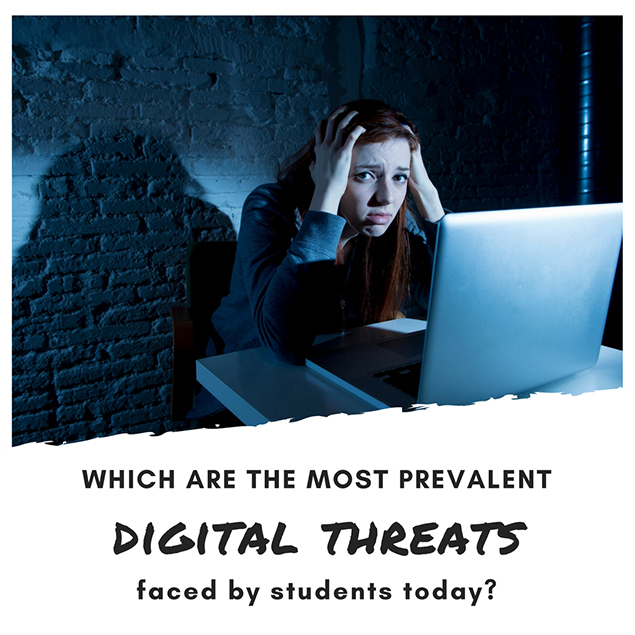5 Prevalent Internet Dangers that Threaten Digital Safety
Posted by Network Support · Leave a Comment
5 Prevalent Internet Dangers that Threaten Digital Safety
Student use of the internet and its applications is at an all-time high. In fact, the digital world is rightly said to be the modern student’s playground. But just as there are many positive and productive uses for the internet, there are also dangers in the online world. It is important that students are aware of these dangers, as awareness can be a significant first step in taking necessary safety measures. Here are 5 of the biggest online threats relevant to students today:
Cyberbullying
Acts of cyberbullying can be just as harmful and damaging as other acts of bullying. Because those affected by online bullying are exposed to such large audiences, and because internet activity is not easily covered up, cyberbullying often has a lasting impact on students’ psyche that may extend beyond the impact of face-to-face bullying. Unlike other forms of bullying, cyberbullying follows students into their homes in the form of online posts, messages and emails. The anonymity gained in the digital world reduces the risk of repercussions for perpetrators. As most of these bullying acts are an extension of problems arising at school, it is important that teachers and school administrators address the issue.
Sexual Predators
The internet is also a playground for sexual predators and pedophiles targeting students. The perpetrators set up fake profiles, posing as fellow students or peers of the same age entice students. They join various chat rooms and form “friendships” with students before soliciting them for adult interactions and real-life encounters. The increasing incidence of online grooming and sexual abuse enhances the need for educating students about cyber sexual predators and the dangers of chatting with strangers on the internet.
Exposure to Inappropriate Content
Students’ exposure to inappropriate content (text, language, images and audio-video clips) may be accidental or intentional, but either way the effects are the same. It can be distorting to students’ perceptions to encounter adult content, and provide them with misinformation. The internet can also connect students with sites and community forums advocating ideologies like violence, racism, and homophobia. Students may be easily influenced by content from these sites, and their behavior and actions may reflect these ideologies. It is important that teachers help students differentiate between appropriate and inappropriate content.
Public Posting
The social media frenzy over getting “likes” sometimes results in excessive posting by students. While this is not necessarily wrong, posting personal information, pictures and videos may be threatening to students’ digital safety. These posts may be used in cyber bullying schemes, attract predators and scammers, or hinder students’ prospects in the future. Remind students that nothing is permanently deleted once posted online, and advise them to be selective and careful when posting content.
Scams, Phishing and Malware
Students are not always safe from online scams, phishing and accidental downloading of viruses and malware. Online gaming is a common source of such digital attacks. For example, students may be tricked into spending money or be instructed to click on links or advertisements to unlock additional features of apps or games. This may inadvertently cause malware or viruses to be downloaded to students’ devices – which can harm the devices or steal personal information from students and their family. Gaming chat rooms can also be risky, as students may accidentally reveal their personal information in the heat of the game, endangering their safety and privacy.
Students often have difficulty separating their real lives from their digital ones. As this increases student vulnerability to digital attacks, educating and creating awareness of these internet dangers is a crucial responsibility of teachers.
Like this article for teachers?
Browse the Professional Learning Board COURSE CATALOG to find related online courses for teachers in your state. Professional Learning Board is a leading provider of online professional development classes that teachers use to renew a teaching license or renew a teaching certificate.





